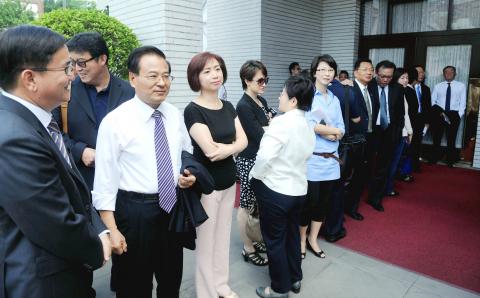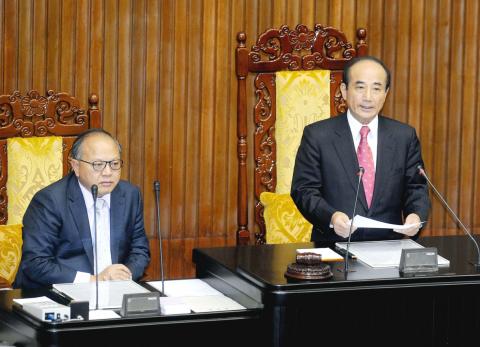Legislators yesterday spent almost six-and-a-half hours at the Legislative Yuan debating a no-confidence motion against the Cabinet, but ended with no consensus.
Seventy-five of the 112 lawmakers were given five minutes each in the plenary session to opine on the Democratic Progressive Party’s (DPP) proposal before the motion is put to a vote this morning.
“The vote would be a monster detector for Chinese Nationalist Party (KMT) lawmakers — an indicator of whether they criticized President Ma Ying-jeou (馬英九) and Premier Jiang Yi-huah (江宜樺) on the one hand and voted to support them on the other,” DPP Legislator Gao Jyh-peng (高志鵬) said.

Photo: Wang Min-wei, Taipei Times
With the DPP controlling only 45 of the 112 votes — 40 of its own, three from the Taiwan Solidarity Union and two from the People First Party (PFP) —the chance of the motion passing the 50 percent threshold hinges on how many KMT lawmakers choose to vote against their own party, which has said that anyone who votes for the motion would face party discipline.
DPP lawmakers said that the rationale behind the motion was strong as Jiang had violated the due process of law and the Constitution in his “participation in a political conspiracy plotted by Ma, ignorance of the prosecutors’ abuse of wiretapping and lying to the public that he was unaware of the plan to remove Legislative Speaker Wang Jin-pyng (王金平).”
The premier has given conflicting statements when asked about Wang’s alleged involvement in an improper lobbying case, DPP Legislator Liu Chao-hao (劉櫂豪) said, first saying that he was not aware of the investigation prior to Sept. 4, but later admitting that he had met with Ma over the case on Aug. 31.

Photo: Wang Min-wei, Taipei Times
The motion of no confidence has become a “humble right” for the weak and “handicapped” legislature, which is not empowered with the right to investigate the powerful executive branch, DPP Legislator Tuan Yi-kang (段宜康) said.
Speaking in favor of the motion, PFP Legislator Thomas Lee (李桐豪) said that Jiang has accomplished almost nothing during his eight-month tenure and sparked controversy with every major policy, including the nuclear policy, the 12-year education plan, the capital gains tax and the cross-strait trade service agreement.
“The proposal is also on the table today because Ma has refused to communicate with the opposition. All he has done is to suppress the opposition by using the KMT majority,” Lee said.
KMT lawmakers countered the motion, criticizing DPP Chairman Su Tseng-chang (蘇貞昌) and the party’s “confrontational” style in the legislature.
“While other countries are working on fixing their economy, all the DPP thinks about is bringing down its political rivals,” KMT Legislator Huang Chao-hsun (黃昭順) said.
The DPP has initiated two no-confidence motions under Su’s leadership and the public is frustrated with the stalemated legislation in the Legislative Yuan because of the DPP’s relentless boycotts, KMT lawmakers said.
Apollo Chen (陳學聖) was one of the few KMT lawmakers who did not exclusively speak along the party line, saying that Ma and Jiang should “re-examine their attitude in handling political affairs” even if the motion failed to pass today.

The Ministry of Economic Affairs has fined Taobao NT$1.2 million (US$36,912) for advertisements that exceed its approved business scope, requiring the Chinese e-commerce platform to make corrections in the first half of this year or its license may be revoked. Lawmakers have called for stricter enforcement of Chinese e-commerce platforms and measures to prevent China from laundering its goods through Taiwan in response to US President Donald Trump’s heavy tariffs on China. The Legislative Yuan’s Finance Committee met today to discuss policies to prevent China from dumping goods in Taiwan, inviting government agencies to report. Democratic Progressive Party Legislator Kuo Kuo-wen (郭國文) said

The Ministry of Economic Affairs has fined Taobao NT$1.2 million (US$36,900) for advertisements that exceeded its approved business scope and ordered the Chinese e-commerce platform to make corrections in the first half of this year or its license would be revoked. Lawmakers have called for stricter supervision of Chinese e-commerce platforms and more stringent measures to prevent China from laundering its goods through Taiwan as US President Donald Trump’s administration cracks down on origin laundering. The legislature’s Finance Committee yesterday met to discuss policies to prevent China from dumping goods in Taiwan, inviting government agencies to report on the matter. Democratic Progressive Party

Taiwan and its Pacific ally Tuvalu on Tuesday signed two accords aimed at facilitating bilateral cooperation on labor affairs, according to Taiwan’s Ministry of Foreign Affairs (MOFA). The governments inked two agreements in Taipei, witnessed by Foreign Minister Lin Chia-lung (林佳龍) and visiting Deputy Tuvaluan Prime Minister Panapasi Nelesone, MOFA said in a news release. According to MOFA, the agreements will facilitate cooperation on labor issues and allow the two sides to mutually recognize seafarers’ certificates and related training. Taiwan would also continue to collaborate with Tuvalu across various fields to promote economic prosperity as well as the well-being of their

Sung Chien-liang (宋建樑), who led efforts to recall Democratic Progressive Party (DPP) Legislator Lee Kun-cheng (李坤城), was released on bail of NT$80,000 today amid outcry over his decision to wear a Nazi armband to questioning the night before. Sung arrived at the New Taipei District Prosecutors’ Office for questioning in a recall petition forgery case last night wearing a red armband bearing a swastika, carrying a copy of Adolf Hitler’s Mein Kampf and giving a Nazi salute. Sung left the building at 1:15am without the armband and covering the book with his coat. Lee said today that this is a serious